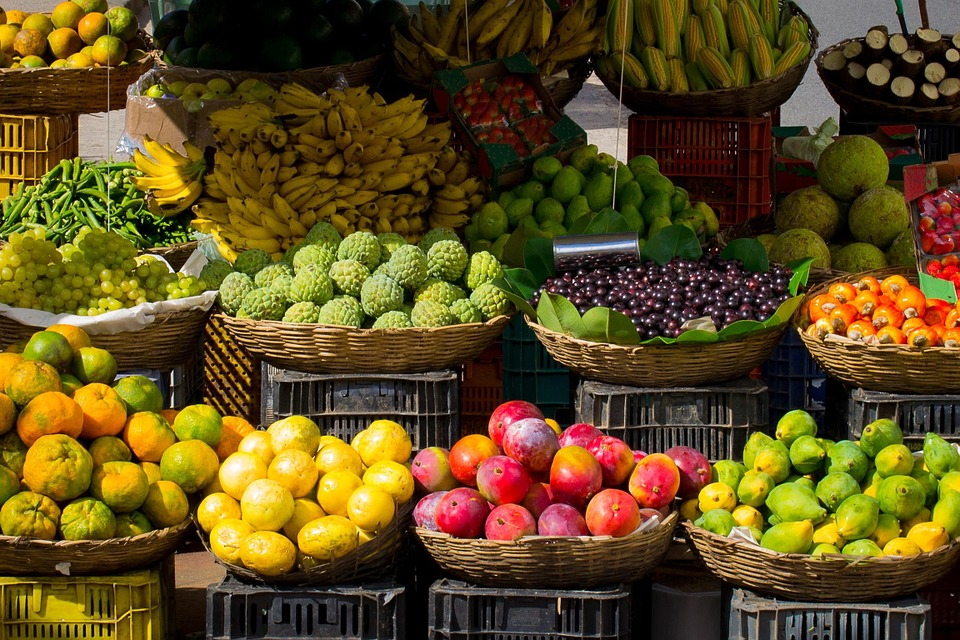How Eating Different Fruits And Vegetables Gives You The Nutrients To Balance Your Hormones
It's no secret that, if the average person had a choice, they wouldn't eat their fruits or vegetables. Maybe they would consume the tastier fruits, but some people have had a hard time eating their vegetables since they were told they needed it as children. However, there's a reason why people are told they need to eat their fruits and vegetables: they give them the essential nutrients their bodies need to survive.
Why Is It Important To Eat Vegetables?
For the average person, vegetables might not be the tastiest part of their dish, but they're low in fat and calories. Vegetables also have no cholesterol. They pack some of the most essential nutrients from potassium to vitamin C.
Vegetables also have dietary fiber, which is important for overall wellness because it helps to lower the risk of heart disease by reducing blood cholesterol levels in the body. Dietary fiber also helps improve digestion and aids in weight loss for those following a balanced diet.
It's important to consume different vegetables, as not every vegetable has the same nutrients in them. Some vegetables, known as "starchy" vegetables, contain more carbohydrates than non-starchy vegetables. Examples of starchy vegetables are sweet corn and potatoes. The same can be said about fruits.
Why Is It Important To Eat Fruits?
Much like vegetables, fruits are low in fat and calories. Fruits also do not have cholesterol and are low in sodium. Many fruits have plenty of potassium, vitamin c, dietary fiber, and other nutrients. The dietary fiber in fruits has the same benefits as the one found in vegetables and will help you feel more full after eating a meal to keep you from overeating.
A combination of eating fruits and vegetables gives you the nutrients you need for an overall healthy way of life that helps to reduce potential health risks such as high blood pressure, diabetes, kidney stones, bone loss, and more. Just like vegetables, you would need to consume different fruits to get different nutrients your body needs, but can nutrients from fruits and vegetables help to balance your hormones?
Why Balancing Hormones Are Important
Not enough people are aware of the importance of balancing out hormones. Our hormones are responsible for almost every process of our bodies. They help to send signals between different organs to do their functions. When our hormones are balanced, our bodies are functional.
Unfortunately, our hormones aren't always balanced. We may have too much or too little of a hormone that can throw the rest of the body out of balance. The glands responsible for secreting these hormones into our bloodstream might be pumping too much or too little of a hormone, and it can affect our everyday way of life. There are some telltale signs that our hormones are not balanced. These are just a small list of symptoms covering many different hormonal imbalances. This list includes, but are not limited to:
● Acne
● Brain fog
● Insomnia
● Mood swings
● Hair loss
● Heart palpitations
● Blood sugar issues
● Infertility
● Bloating
● Fatigue
The smallest imbalance can have an effect on your body. Fluctuations of hormones are normal, especially for women during pregnancy or during their menstrual cycles, but men also experience an imbalance or fluctuations of their hormones at some point in their life.
However, if the fluctuations are becoming too common or they're causing issues, then one of the glands in the endocrine system might not be working the way it should be. There might also be an underlying health issue such as diabetes, stress, or other medical conditions. It's important to speak to your doctor to have your hormone levels checked if you believe it's the culprit behind your symptoms. Fortunately, if they're mild enough, you don't need to turn to medications. The nutrients from different fruits and vegetables can help to bring your hormones back into balance.
Can Different Fruits and Vegetables Balance Your Hormones?
Keeping your hormones in check is the first thing you should take care of when you find out you have an imbalance. Vegetables and fruits are recommended to provide the essential nutrients your body needs to drift back into harmony. Let’s take a look at some of the nutrients found in different fruits and vegetables and how they can help bring your hormones into balance.
Vitamin D
While vitamin D is an important vitamin for balancing hormones, it’s not found in a lot of plants. Fortunately, outside of fortified foods, mushrooms are the best plant-based source of vitamin D.
You normally get vitamin D from the sun. Unfortunately, getting outside isn’t always possible with how busy life can get. That means if we’re not getting enough vitamin D from the sun or other sources, we’re not getting enough of this essential nutrient our bodies need for various functions such as keeping our bones strong.
Not getting enough vitamin D has been linked to everything from heart diseases to mood disorders such as depression. Vitamin D is also essential for balancing our adrenaline hormones. Without enough vitamin D, you're putting your body at risk of:
● Fatigue
● Cancer
● Depression
● High blood pressure
● Hormonal imbalance
● Weak bones
Many people aren’t aware that vitamin D is considered a “pro-hormones,” meaning your body eventually converts vitamin D into a hormone itself when in contact with the sun. Not getting enough can affect your parathyroid, which are small glands in the neck separate from the thyroid gland itself. These glands are responsible for regulating your calcium levels using vitamin D.
Men will also benefit from vitamin D because of how it affects their testosterone hormone. Low levels of vitamin D are linked to lower levels of testosterone in men. That’s why it’s important to reach for different vegetables when you’re shopping. If you want a vegetable to give you a healthy amount of vitamin D, then you need to grab some mushrooms.
Vitamin E
Vitamin E isn’t as well known as the other vitamins like A or B12, but it’s still an important vitamin needed for balancing hormones. Women, especially, find benefit from vitamin E because it is an antioxidant that helps to minimize oxidative stress, reduce symptoms of depression, and help bring harmony back to the body for women suffering from the low levels of estrogen hormones.
Men also benefit from vitamin E as, much like vitamin D, helps to balance the production of testosterone. For men, it’s important to keep low levels of estrogen. However, estrogen can elevate in men, which lowers the levels of testosterone and energy production in the body.
Vitamin E comes in a variety of sources, from sunflowers to corn and peanuts. Corn alone is one of the best sources of vitamin E that helps protect against cell damage. Vitamin E is also essential for regulating the hormone-like prostaglandins, a substance similar to hormones directly linked with muscle contractions and blood pressure.
Potassium
While many vegetables have potassium, fruits are one of the best sources of potassium. Not enough people get enough potassium in their body, and it can cause some issues:
● Diarrhea
● Vomiting
● High blood pressure
● Weaker bones
● Kidney stones
● Fatigue
● Dizziness
● Heart palpitations
● Hormonal imbalance
● Muscle contractions
As we all know, bananas are one of the best sources of potassium. Unfortunately, many people don't think of turning to bananas or other sources of potassium, which is why they're suffering from a hormonal imbalance, muscle contractions, and other health issues. Low levels of potassium are also linked to low energy levels. That's because our cells need a certain amount of potassium in order to properly function. Without enough potassium, our cells get tired, which is why we feel fatigued and sluggish when we don't get enough in our bodies. Potassium is linked to several hormones, from insulin to glucagon. That's why it's important to seek out potassium-rich fruits such as bananas, watermelon, or apricots. A lot of other fruits also have other essential vitamins to help regulate hormones, such as vitamin C. That's why it's important to select different fruits when shopping in the produce section of your favorite store.
Vitamin C
Whether you have a hormonal imbalance caused by pregnancy, menopause, or health issues, it's always important to get enough vitamin C in the body. There are many fruits rich in vitamin C, such as grapefruits, mangos, cantaloupe, strawberries, watermelons, kiwi fruits, and more. There's no shortage of fruits that can give you the vitamin C your body needs to function properly.
The reason why vitamin C is so important is that it’s an antioxidant that helps keep your immune system healthy, your hormones balanced, and your collagen synthesized. In fact, it’s one of the most effective nutrients out there that can do everything from keeping our eyes healthy to keeping our heart healthy. Low levels of vitamin C can do a number on our body’s tissues and various functions. Vitamin C also lowers your risk of heart attack or stroke because of how it can relax the blood vessels that move blood to and from the heart. People who have a healthy amount of vitamin C are found to have lower levels of systolic and diastolic blood pressure.
When your hormones are out of balance, it can also cause inflammation in your joints. Vitamin C also helps to relieve joint inflammation and prevent gout by lowering the levels of uric acid in the blood. When the blood has higher levels of uric acid, it can form around different joints in the body.
Poor hormonal balances also lead to brain fog, memory loss, and other mental issues. That’s why it’s important to get enough vitamin C to lower the risk of memory disorders such as dimension or mood disorders such as depression. It’s best to find this impressive vitamin in the various fruits listed above to help keep your hormones balanced.
Vitamin B6
Vitamin B6 is one of the least-known of the B vitamins, and it's difficult to find outside of very specific fruits and vegetables. That's why it's important to choose different fruits and vegetables when looking for the nutrients you need to balance your hormones. Sweet potatoes, bananas, and avocados all contain vitamin B6.
Women, especially, will benefit from vitamin B6 because of how it can reduce symptoms of premenstrual syndrome (also known as PMS). It helps to suppress too much estrogen produced by the body to alleviate a lot of the symptoms and improve the mood. Vitamin B6 is a water-soluble vitamin that can help support the production of dopamine and serotonin in the body. These are neurotransmitters and not hormones, but they’re important for helping to release different hormones into the body for mood and brain health.
Vitamin B6 helps maintain healthy energy levels by improving the metabolism of different proteins. Low levels of vitamin B6 can cause:
● GERD
● Nightmares
● Low energy
● Hormonal imbalance
● Headaches
● Nausea
● Anemia
Vitamin B6 can also help those who have diabetes or are at risk of diabetes by helping to balance blood sugar. This is especially important for women who developed gestational diabetes. That’s why it’s important to seek out the different fruits and vegetables to get the vitamin B6 necessary for balancing hormones.
Fruits and vegetables are important for balancing hormones, but they’re also important for various other body functions too. You should always have a variety of fruits and vegetables available for a well-balanced diet and healthier overall physical and mental wellness.

